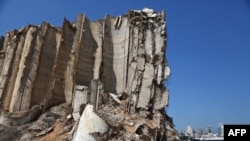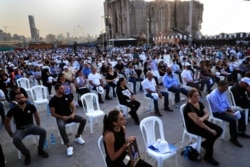The lead judge investigating last year's massive blast in Beirut's port suspended his work in the case Monday after a former Cabinet minister demanded his dismissal.
Judge Tarek Bitar, the second judge to lead the complicated and thorny investigation, canceled the questioning of a former military intelligence general, scheduled for Monday. The Court of Appeals now has to decide whether to dismiss him from the case.
Bitar's removal, if it happens, would likely be the final blow to the inquiry, making it highly unlikely that a third judge would take up the job amid threats by members of the country's political elite who have closed ranks in their effort to block the investigation.
The development comes amid a growing campaign by Lebanon's political class against Bitar, who took over the job in February after his predecessor, Fadi Sawwan, was removed following similar legal challenges by senior officials he had accused of negligence that led to the blast.
On August 4, 2020, hundreds of tons of ammonium nitrate, a highly explosive material used in fertilizers that had been improperly stored in the port for years, exploded, killing at least 214 people, injuring more than 6,000 and devastating nearby neighborhoods.
Families of the victims of the explosion have already demanded an international probe, not trusting the Lebanese investigation. Lebanon is known for a culture of impunity that has prevailed for decades, including among the entrenched political elites.
The attempt to remove Bitar angered families of the victims who have been hoping that the judge would reveal who was responsible for bringing the material to the port and storing it in a port warehouse for years, as well as what caused the explosion described as one of the largest non-nuclear explosions in history.
"He was the best hope for Lebanese justice, but they are torpedoing everything," said Mireille Bazergy Khoury, whose son Elias, 15, was killed by the explosion. She said the repeated lawsuits and challenges to the judge prove that those officials are implicated in the explosion.
"I can't find the words to capture how sad and frustrated I am. I feel like every time something like this happens, they kill me once again," Khoury said.
She said the families will try to legally challenge the obstruction attempts. "They killed my son, my daughter was injured, my home was destroyed, my life is in ruins."
Bitar in July announced his intention to go after senior Lebanese officials and summoned for questioning then-outgoing Prime Minister Hassan Diab, three former Cabinet ministers and top security officials.
None showed up for questioning; the parliament failed to lift immunity of those summoned — a necessary step before any prosecution. Diab's office and then-interior minister, Mohamed Fehmi, declined to let Bitar question the heads of two security agencies.
On Friday, former Interior Minister Nouhad Machnouk, who was also implicated in the probe, filed a motion to dismiss the judge.





